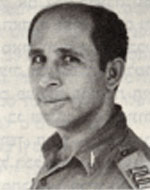Yishai was born on September 11, 1936 in Tel Aviv and completed his studies at the Weizman elementary school in Herzliya and at the agricultural school in Beit Yerah. Yishai was about two years old when the family arrived in Herzliya at the end of the summer of 1938. As a child, he was charming and excited in conversations with his friends, and even then he imagined and told about the country. He was wide-ranging in his stories and actions. Yishai loved literature and poetry very much. From an early age, he read poetry books and devoted his best time to studying Alterman songs, Rachel’s poems, and the works of Russian writers. He wrote dozens of poems, devoted mainly to his favorite subject, which was inherent in his blood from childhood – the love of the Land of Israel. He wrote love songs for Israel, Jordan and the Sea of Galilee, as well as poems in memory of fighters who fell in the War of Independence and in the Israeli system in general, of which his good friends fell. Yishai devoted much time, energy, and thought to the youth. In his youth, he was active in the Hanoar Haoved movement, was a well-known youth leader in the Land of Israel, organized marches and managed youth clubs, and was a member of the Labor Party in Herzliya, Hapoel “in Herzliya. Yishai was drafted into the IDF in early January 1954 and served in the paratroop brigade. That same year he participated in a face-to-face battle with Fedayeen in the battle that hit Nitzana and wounded his head and ear. So they reduced his fighting ability and he did everything to restore his full combat capability. In the Nahal Brigade he was able to express both his talents in dealing with youth and young soldiers, and his ability to command, train, and serve as a leader. The Command and Down School. During his years of service, he held a long list of command and training positions: he was the commander of the Kerem Shalom outpost, commander of the Lachish district, platoon commander and platoon commander in the parachute Nahal Brigade, and was a graduate of the IDF Command and Staff School. Yishai was a citizen for a number of years, and these years were also sacred for youth and security work. Hundreds of youths were his students in Gadna and they remember him as an educator and exemplary teacher, admired for his simplicity of conduct, his love of his people, and above all for his wonderful ability to educate, guide, lead, and lead people after him. , The love of the land and its history, and the blood of Jewish tradition, when the Bible serves as a guiding light. For several years he lived with his family in a young moshav at the time, Lachish, where he worked the land with his wife Ofra, and was in charge of security in the area. After the Six-Day War, he returned to the IDF, where he commanded the outposts, the days of the Nahal Brigade’s ground up, and served as company commander and battalion commander. During the War of Attrition he served as a commander in Tessa, in the Nahal-Yam and in the “Beluzah” camp, and twice during this difficult period he went on mines and Hans survived. . His apprentices in this institution will not forget his exhilarating lectures on purity of arms, national values and morality. He was the owner of the “Chinese Sign”, “The Six Day War” and “Operation Service Mark”. Yishai was an exemplary family man, a devoted son to his parents, a good brother to his seven sisters and his brother Shlomo, a caring and faithful husband to his wife Ofra and a wonderful father to his two daughters, Orit and Michal. His leisure was devoted to the family and reading books. During the Yom Kippur War, Yishai volunteered to serve in a combat unit. He joined the brigade whose people he knew well. On the 25th of Tishrei 5734 (25.10.1973) he received command of the force. His task of force was toTook over the entrance to the city of Suez. A squad of five men, commanded by Yishai, emerged as a pioneer in front of the force, to inspect the area at the entrance to the city and encountered Egyptian fire. Yishai went out alone to find the source of the shooting and was hit and killed. He was brought to eternal rest in the Herzliya cemetery. He left behind a wife and two daughters, parents, seven sisters and a brother.
